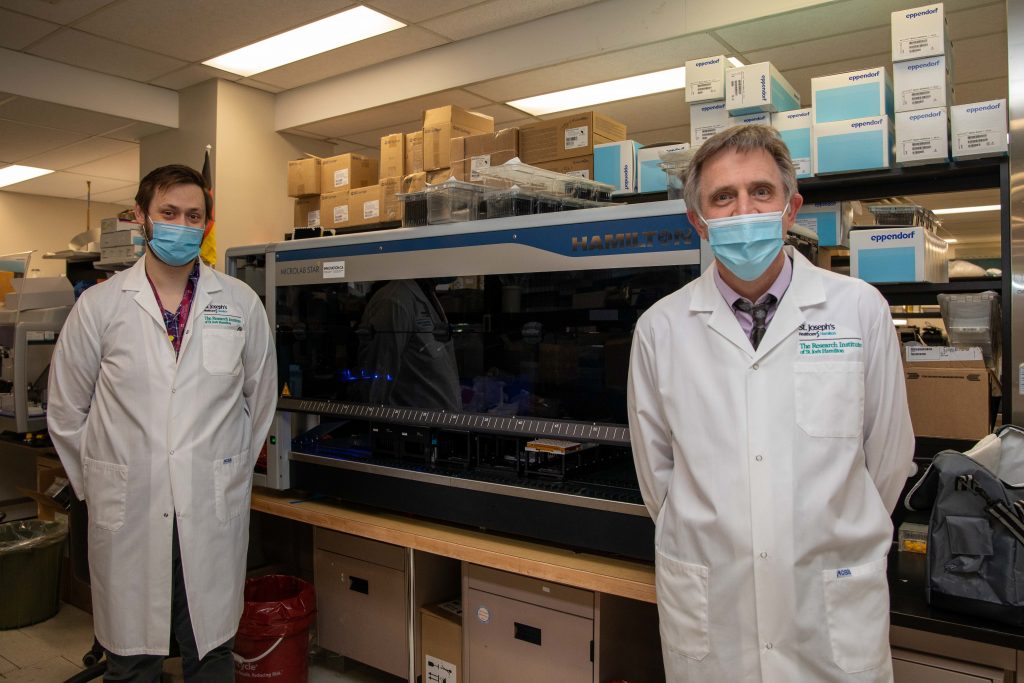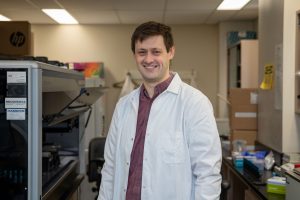HAMILTON, ON (May 21, 2020) – Scientists at The Research Institute of St. Joe’s Hamilton have developed entirely novel COVID-19 testing methods, which will allow for a significant increase in testing capacity across the province.
The new methods are being implemented in the Hamilton Regional Laboratory Medicine Program (HRLMP) – a partnership between St. Joseph’s Healthcare Hamilton and Hamilton Health Sciences – which is responsible for conducting clinical COVID-19 testing for the region. Currently, the HRLMP clinical testing capacity is 800 samples per day. With these advancements in place, scientists are aiming to test up to 6,000 samples daily.
Dr. David Bulir and Dr. Marek Smieja, infectious disease physician-researchers from St. Joe’s Disease Diagnostics and Development (D3) Group, predicted the need for an alternative supply of testing materials in January.
“In the face of global shortages, we’ve had to secure a new supply of all the materials required for COVID-19 testing, as well as invent some components that enable mass testing,” said Dr. Gail Martin, Executive Director of The Research Institute of St. Joe’s Hamilton. “St. Joe’s has effectively rebuilt and secured an entire supply chain, one that is urgently needed to manage the shortage of testing supplies.”
While some materials have been sourced and validated from new suppliers, such as flocked swabs and specimen tubes, other materials, including the new transport medium, are entirely novel. Dr. David Bulir developed the new transport medium and an enhanced test for COVID-19 at St. Joe’s research laboratory.
One of the key benefits of using these new testing materials with Dr. Bulir’s newly developed COVID-19 test is the ability to pool specimens. Specimen pooling can enable labs to increase their testing capacity up to fourfold, and potentially more. Since most tests produce negative results, only pools that come back with positive results will need to be further examined.
Building up the province’s stockpile of testing supplies and its capacity to perform rapid testing are vital as municipalities gradually lift lockdown restrictions.
“We’re working with the province to ensure we can rapidly develop ways to provide these new materials to other labs,” said Dr. Martin. “This is a Made-in-Ontario solution to a critical global shortage.”
This project will have a significant impact on the increased testing that will be needed to emerge from COVID-19, the value of which has been demonstrated through the Surveillance Pilot Project, launched in collaboration with St. Joseph’s Health System. That project aimed to detect the spread of COVID-19 and determine the most effective testing strategies in long-term care and congregate settings.
Development of these innovative testing methods could not have been possible without the support and funding from the Juravinski Research Institute, the Ontario COVID-19 Rapid Research Fund, St. Joseph’s Health System, and The Research Institute of St. Joe’s Hamilton.
Premier Doug Ford announced the Ontario COVID-19 Rapid Research Fund projects at a press conference Thursday afternoon, expressing his enthusiasm for the St. Joe’s project.
Background Info:
Shortage of testing supplies
- Due to factory closures in Italy where the gold-standard flocked swabs and transport media are produced, as well as stockpiles that were not maintained at pandemic-level quantities by manufacturers, standard testing supplies are scarce.
- St. Joe’s researchers designed a new supply chain to address this issue across Ontario
Specimen pooling
- Instead of running each specimen through its own test, specimens can be combined into a single test to increase throughput.
- Since most tests are expected to have negative results, pooling allows for massive increases in concurrent testing. Specimens pools that come back positive can be further tested individually.
- Pooling will allow many more tests to be performed in the same timeframe
Deployment of robotic liquid handling technology
- Using robotics in the laboratory reduces risk to lab technicians, while increasing the speed and the number of concurrent tests that can be run
New transport medium
- A transport medium is the liquid in the specimen tube that maintains the integrity of the sample while it is transported to the lab.
- Unlike many transport media that keep the virus intact before testing, St. Joe’s new transport medium breaks down the virus, effectively killing it.
- The new transport medium works well with Dr. Bulir’s robust COVID-19 test. This new medium reduces biological risk to the scientists conducting the tests and enables increased testing capacity.
BY DON MITCHELL GLOBAL NEWS
Two well-known philanthropists are set to give Hamilton health researchers a $3.3-million boost to help fund urgent research projects connected to the COVID-19 pandemic and mental health.
In a letter to the community, Charles and Margaret Juravinski say they are donating funds to free everyone from the “terrible virus,” and allow the public to “live and move about without fear of spreading or picking it up.”
“Like everyone, we are deeply troubled by the fearsome threat of COVID-19, which has truly changed the world in just a few months,” the couple said in their letter.
“We are concerned not for ourselves, but for the people around us: our friends and family, our neighbours near and far, the people who work in our community’s grocery stores, restaurants and hospitals and the kids who should be out playing in our schoolyards.”
The money is an advance on a pledge made in May when the couple promised to divide their $100-million estate between Hamilton Health Sciences, McMaster University and St. Joseph’s Healthcare Hamilton, a gift they say would generate up to $5 million annually for the three agencies under the banner of the Juravinski Research Institute.
Charles, 90, and Margaret, 88, known for endowments with a number of projects connected to the city, McMaster University, and healthcare, compare the COVID-19 pandemic to a number of “frightening problems” they experienced during their lifetime including the Great Depression, the Second World War and the scourge of polio.
“Our wish is that it may inspire hope,” the couple said of the donation, “We hope it will produce results that benefit people immediately. We urge others to find ways to give what they can.”
In a joint statement, Hamilton Health Sciences, McMaster University and St. Joseph’s Healthcare Hamilton say the funding will support eight collaborative research projects which include:
- A study on the effectiveness of N95 respirators or medical masks
- A three-part study on the impact of the pandemic on hospital emergency departments and staff
- speed up of diagnostic testing protocols for viral pathogens responsible for the COVID-19 using robotics
- An age-related study of 50,000 people ages 45 to 85 to close in on factors that appear to protect against or increase the risk of developing symptoms connected to COVID-19
- COVID-19 repository for storing human biological samples
The money is also earmarked for three mental health projects including a study on the impact of substance use in relation to the brain development of young adults, technology to identify brain anomalies following a mild traumatic brain injury, and AI technologies offering data on potential treatments to aid youth mental health.



